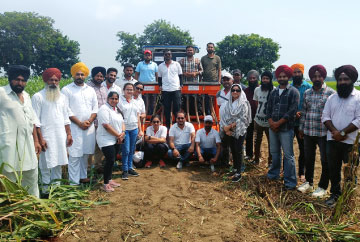Over the course of four years, Project Shodhan has extended its reach to encompass more than 100 villages and approximately 70,000 acres of land.
This extensive effort has positively impacted around 50,000 families and effectively mitigated the environmental repercussions not only in Delhi, Uttar Pradesh (UP), Punjab, and Haryana but also beyond. Impressively, the initiative has prevented the burning of 27,000 tonnes of rice straw, with 25,000 tonnes successfully recycled back into the soil.
Perhaps the most remarkable achievement lies in the fact that approximately 80 percent of farmers have embraced these sustainable practices, leading to a significant reduction in stubble burning. Project Shodhan’s exceptional success is underscored by its three consecutive ‘SABERA’ awards in the ‘Paryavaran’ (Environment) category.
In your opinion, what are the key challenges and opportunities that lie ahead for the manufacturing industry in terms of embracing technology for sustainable practices?
Some key challenges and our approach towards each –
- Getting past stakeholder’s resistance to change and making them adopt new sustainable practices
In this scenario, strong business cases were created which outlined sustainability’s long-term advantages aligning it with the organisation’s vision and mission. We have offered training education and workshops to create awareness which highlighted successful sustainable case studies and projects with positive outcomes. Also, we have included stakeholders in the transition process to update them of process change.
- Ensuring sustainability along complex supply chains was challenging because of diverse suppliers, limited visibility and potential impact/risks on the environment
Supply chain mapping and tracking were implemented to involve suppliers in sustainability programmes like establishing sustainable procurement processes, disclosing relevant information/practices and encouraging leverage of technology solutions to increase traceability. It also includes conducting regular audits.
- Adopting emerging technologies may involve implementing new technologies which might not be compatible with existing ones and can cost money for replacement
Implementing data mapping, transformation, and sustainable middlewares for compatibility issues. Educating customers on how the use of emerging technologies like 5G, AI, IoT can offset the cost of replacement.
Birlasoft has implemented various digital solutions to drive sustainable manufacturing. Could you provide specific examples of technologies or innovative solutions that have been successfully deployed?
Manufacturing organisations of all sizes are currently intensifying their efforts to establish comprehensive and impactful Environmental, Social, and Governance (ESG) strategies.
While ESG encompasses a wide range of factors, our role as a Systems Integration (SI) partner places a specific focus on the environmental aspect of ESG, particularly centred on decarbonization and environmental sustainability.
Birlasoft has a track record of successfully delivering solutions in the realm of environmental sustainability, and I’d like to highlight two exceptional examples:
A prominent Fortune 500 Engine Manufacturer set ambitious sustainability targets for 2030, including significant reductions in greenhouse gas (GHG) emissions and absolute water consumption from their facilities and operations. Birlasoft responded with an innovative “Energy Consumption Management” solution that leveraged IoT, Edge computing, and AI-driven analytics. This system collected data from various interoperable sources, creating a global data model stored in Azure IoT cloud. It monitored over 30 key performance indicators (KPIs) related to emissions, water, and energy throughout the production process, providing crucial insights into carbon hotspots.
In another instance, a leading Indian automotive manufacturer faced challenges related to quality control at vendor locations, resulting in a high rate of rejected and defective parts. Birlasoft introduced a “Distributed Quality Control” solution using the PTC Thingworx IIoT platform. This initiative covered 85 processes, including those within the manufacturer’s facilities and across 50+ supplier locations. It captured quality data from local SCADA servers, enabling real-time process monitoring, anomaly detection, and the generation of performance dashboards and reports. Grounded in the principles of digital lean management, this solution achieved a remarkable 25-30 per cent reduction in rejection rates and a 10-15 per cent decrease in scrap, all while contributing to energy-saving and sustainability objectives.
Collaboration and partnerships play a crucial role in driving sustainable manufacturing. Can you highlight any collaborations or partnerships Birlasoft has formed to foster sustainability in the manufacturing sector?
Partners are an integral part of our manufacturing ecosystem and form the foundation of our business go-to market strategy. Birlasoft is strengthening its partnership with existing partners such as Microsoft, SAP, Oracle and working together to address sustainability challenges for manufacturing customers through their inbuilt sustainability solutions.
Furthermore, we are also working with key ISV partners like Rockwell, PTC and Dassault on various IIoT solutions fostering sustainability goals for our customers. Not only this, we also work with some niche partners in the sustainability and decarbonization space focusing on devising the right roadmap for sustainability jointly for our clients.
We have also partnered with the Manufacturing Leadership Council, the industry thought leader, to gain industry insights, understand the pulse of the ecosystem and sharpen our offerings accordingly.
Birlasoft has a diverse client base. How do you support your clients in adopting sustainable manufacturing practices? Do you offer any consultation or technology solutions to help them achieve their sustainability goals?
We follow the proposition of Consult, Record, Report & Act. In the 1st step, our sustainability domain experts get in touch with the client, understand their As-Is challenges, envision their sustainability ambition and create the sustainability strategy, turning ambitions into actions.
The second step involves recording, which means establishing a baseline for the current emissions level. In this phase, our ‘Energy Consumption Management’ offering, powered by AI/ML, plays a crucial role. It simplifies and automates data capture, presenting the data in a centralised dashboard with detailed analytics and performance tracking across key performance indicators (KPIs), providing visibility into emission hotspots.
For the third step, we employ an ESG reporting tool, which assists in reporting the current emission levels to regulatory authorities, adhering to the GRI Reporting Standards Framework and SASB Reporting framework. This tool provides visibility into carbon hotspots throughout the value chain.
In the fourth step, manufacturing executives are prompted to reconsider their business-as-usual approach and make enterprise-level decisions aimed at minimising their emissions footprint. As their preferred systems integration partner, we establish the appropriate Key Performance Indicators (KPIs) to drive action, monitor progress, and share updates with key stakeholders, thus facilitating the achievement of their sustainability targets.


